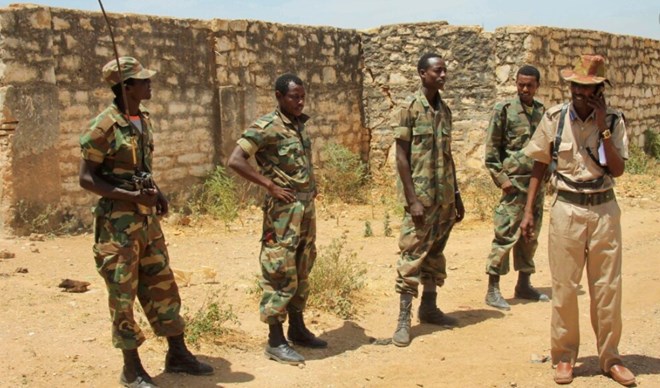
By Mohamed Olad Hassan
Friday September 13, 2024

FILE - Ethiopian soldiers patrol in Baidoa, Somalia, Feb. 29, 2012, as part of the African Union peacekeeping mission known as ATMIS. In 2024, there is concern that tensions between Somalia and Ethiopia could lead to fighting between Ethiopian soldiers in Somalia and Somalis.
MOGADISHU, SOMALIA/WASHINGTON — In an exclusive interview, U.S. Ambassador to Somalia Richard Riley shed light on the ongoing diplomatic efforts and security challenges facing the East African nation, including U.S. efforts to find a peaceful diplomatic solution to the ongoing dispute between Somalia and Ethiopia.
Somalia and Ethiopia have been in a dispute that was ignited at the beginning of this year when Ethiopia signed a memorandum of understanding, or MoU, with the breakaway region of Somaliland — a deal Somalia sees as an infringement on its sovereignty.
The agreement gives Ethiopia leasing rights to a large portion of the Red Sea coastline in Somaliland.
During the interview conducted at the U.S. Embassy in Mogadishu, Riley, who was sworn in to his post in May, shared with VOA his insights on the U.S. commitment to finding peaceful resolutions and supporting the Somali government in combating terrorism.
Diplomatic resolution
“We are very much aware and working collaboratively to make sure there is a diplomatic resolution of this current situation,” he said. “It is an unfortunate situation, very disruptive, and started ... with this MoU between Somaliland and Ethiopia. Of course, we do not recognize it, and we are trying to solve it through diplomatic channels.”
Turkey, a key Somali partner, has been trying to mediate the dispute between the neighboring countries, holding two rounds of talks in Ankara that ended without an agreement.
The Ethiopian and Somali foreign ministers who represented their countries at the meeting did not hold direct talks. Turkey’s foreign minister shuttled between them.
Turkish Foreign Minister Hakan Fidan described the talks at the time as “candid, cordial and forward-looking.”
Abdi Aynte, a former Somali minister of planning and international cooperation who was involved in the negotiations, said the only thing the two sides agreed upon was to reconvene on September 17.
“The core issue remains Ethiopia’s refusal to annul the MoU with Somaliland, which is Somalia’s position, and if Ethiopia continues to insist on its position of not withdrawing from the MoU, I think there is nothing to expect from any talks between the two countries,” Aynte said.
Another analyst who spoke with VOA earlier this year, Cameron Hudson, who is a researcher at the Washington-based Center for Strategic and International Studies, questioned the United States’ commitment and ability to quell tensions in the volatile region.
Riley said he is hopeful, though, that a solution may come from the third round of talks in Turkey.
“There are negotiations ongoing,” he said.
Concerns about potential conflict
Fears have been growing in Somalia that the boiling tensions could turn into an armed conflict between Ethiopian soldiers currently stationed in Somalia and Somalis.
Riley said such confrontation is “unacceptable.”
“No one can accept there would be any kind of conflict, much less war,” he said. “That is why everybody in the international community is working nonstop. We certainly are, from the United States and from Washington, to find the proper resolution of this conflict between Ethiopia and Somalia. This is absolutely needed. It is needed soon very quickly, and you have the full power and support, Somalia does, to make sure there is a proper diplomatic solution.”
Ethiopian troops became part of the African Union mission, known as ATMIS, in Somalia in January 2012. Under the mission, at least 3,000 Ethiopian soldiers officially operate as part of an AU peacekeeping mission fighting al-Shabab. An additional 5,000 to 7,000 Ethiopian soldiers are stationed in several regions under a bilateral agreement.
Last month, the United Nations Security Council passed Resolution 2748, which allows ATMIS troops to stay in Somalia through December 2024.
Somalia says all Ethiopian troops should be out of the country by the end of 2024, especially after the expiration of ATMIS. Somali Prime Minister Hamza Abdi Barre said last month that Ethiopian forces would not be part of the upcoming African Union Support Mission in Somalia, or AUSSOM, unless Ethiopia withdraws from the controversial memorandum of understanding.
Commitment to Somalia’s security
Riley said the U.S. is Somalia’s largest donor and security partner, providing tens of billions of dollars over the years in personnel, equipment and funding. “The United States, for example, just forgave over $1 million of Somali sovereign debt,” he said.
He added that the U.S. will extend full support to any mission whose objective is to make Somalia a peaceful place.
“We absolutely have always strongly supported the current ATMIS force here. We are very grateful to the troop-contributing countries, who have provided very brave personnel for many years to assist the federal government to bring stability and security here,” Riley said. “We are looking forward to this transition so that it is a proper one, it is well organized, and it is efficient, and it does the job. That is the main issue to make sure that the mandate of the follow-on force under AUSSOM will be suited to the need.”
Two urgent issues
He said there are imperative challenges in Somalia that the U.S. wants to help the country handle.
“There are two immediate urgencies: to ensure that the Somali National Army and armed forces, including the police, receive all the resources they need to fight against horrific terrorist groups like al-Shabab and ISIS,” he said. “The other challenge is to ensure that the economy of Somalia continues to grow, with more investment and connectivity to international markets. Somalia needs both physical and economic security.”
This story originated in VOA's Somali Service in collaboration with VOA's Horn of Africa Service. Reporters Abdulkadir Abdulle and Abdulkadir Zubeyr contributed to the report from Mogadishu.